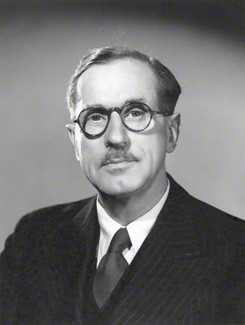William Strang, 1st Baron Strang facts for kids
William Strang (born January 2, 1893 – died May 27, 1978) was an important British diplomat. He advised the British Government for many years, from the 1930s to the 1950s. He also held a very important job as the main leader of the Foreign Office from 1949 to 1953.
Contents
Early Life and School
William Strang was the oldest son of James Strang, who was a farmer. His mother was Margaret Steven. William went to school at Palmer's School. He also studied at University College, London and at the Sorbonne in Paris, France.
Military and Diplomatic Career
William Strang joined the army in 1915 and fought in World War I. He finished the war as a captain.
Joining the Diplomatic Service
In 1919, he joined the Diplomatic Service. This meant he worked for the British government in other countries. He worked at the British embassy in Belgrade from 1919 to 1922. Then he worked at the Foreign Office in London from 1922 to 1930.
From 1930 to 1933, he worked at the embassy in Moscow, Russia. While there, he helped with a big event called the Metro-Vickers engineers trial. In this trial, six British engineers were accused of spying. Strang played an important part in helping them.
He came back to the Foreign Office in 1933. He led the League of Nations section until 1937. The League of Nations was an early international group trying to keep peace. From 1937 to 1939, he led the Central Department.
Advising the Government
During the 1930s, Strang was a key adviser to the government at big international meetings. He met famous leaders like Mussolini from Italy, Hitler from Germany, and Stalin from Russia. He did not agree with the idea of "appeasement," which meant trying to avoid war by giving in to Hitler's demands. However, he always remained loyal to his government. From 1939 to 1943, he was an assistant leader for European affairs.
World War II Role
Strang was present at important meetings between the Allied leaders during World War II. These meetings helped decide how the war would be fought and what would happen afterwards.
In 1943, Strang became the British representative on the European Advisory Commission. This group was set up by the Allies to think about problems in Europe after the war. They made suggestions, but the group was later closed. In June 1945, Strang became an adviser to Bernard Montgomery, who was the leader of British forces in Germany.
Post-War Leadership
Strang returned to the Foreign Office in 1947. He was the main leader for the German section from 1947 to 1949. Then, from 1949 to 1953, he became the top leader for all foreign affairs.
During his six years in this top role, Europe slowly recovered from the war. This included the Marshall Plan, which helped rebuild Europe. Also, important groups like the Western European Union and NATO were created. He also saw the end of the Berlin blockade, when the Soviet Union tried to block supplies to West Berlin. He retired from the Foreign Office in December 1953.
Honours and Later Life
William Strang received many awards for his service. He was made a Member of the Order of the British Empire (MBE) in 1918. He also received high honours like the Companion of the Order of St Michael and St George (CMG) in 1932 and the Companion of the Order of the Bath (CB) in 1939. He received even higher honours in 1943, 1950, and 1953.
In 1954, he was given the title of Baron Strang. This meant he became a "peer" and could sit in the House of Lords, which is part of the British Parliament. He served as a Deputy Speaker there. He also led the Crossbench Peers, who are members of the House of Lords who don't belong to a political party.
He was also the head of the Royal Institute of International Affairs and a committee at University College, London. He wrote several books about his work, including The Foreign Office (1955) and his autobiography Home and Abroad (1956).
Family
In 1920, William Strang married Elsie Wynne Jones. They had two children:
- Colin (born 1922 – died 2014), who became the next Baron Strang.
- Jean (born 1921 – died 1988).
Connection to Fehmarn
William Strang is highly respected on the island of Fehmarn in the Baltic Sea. During meetings after World War II, he argued that Fehmarn should not become part of the Soviet Union's control. Because of his efforts, the island remained free. Even though he never visited Fehmarn, people there remember him for his help.
Lord Strang passed away when he was 85 years old.
 | Janet Taylor Pickett |
 | Synthia Saint James |
 | Howardena Pindell |
 | Faith Ringgold |


